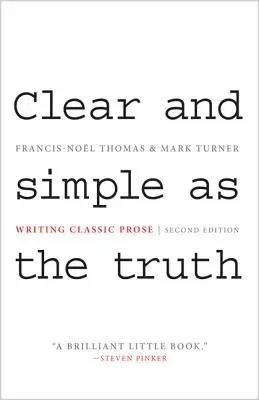For more than a decade, Clear and Simple as the Truth has guided
readers to consider style not as an elegant accessory of effective prose
but as its very heart. Francis-Noël Thomas and Mark Turner present
writing as an intellectual activity, not a passive application of verbal
skills. In classic style, the motive is truth, the purpose is
presentation, the reader and writer are intellectual equals, and the
occasion is informal. This general style of presentation is at home
everywhere, from business memos to personal letters and from magazine
articles to student essays. Everyone talks about style, but no one
explains it. The authors of this book do; and in doing so, they provoke
the reader to consider style, not as an elegant accessory of effective
prose, but as its very heart.
At a time when writing skills have virtually disappeared, what can be
done? If only people learned the principles of verbal correctness, the
essential rules, wouldn't good prose simply fall into place? Thomas and
Turner say no. Attending to rules of grammar, sense, and sentence
structure will no more lead to effective prose than knowing the
mechanics of a golf swing will lead to a hole-in-one. Furthermore,
ten-step programs to better writing exacerbate the problem by failing to
recognize, as Thomas and Turner point out, that there are many styles
with different standards.
The book is divided into four parts. The first, "Principles of Classic
Style," defines the style and contrasts it with a number of others. "The
Museum" is a guided tour through examples of writing, both exquisite and
execrable. "The Studio," new to this edition, presents a series of
structured exercises. Finally, "Further Readings in Classic Prose"
offers a list of additional examples drawn from a range of times,
places, and subjects. A companion website, classicprose.com, offers
supplementary examples, exhibits, and commentary, and features a
selection of pieces written by students in courses that used Clear and
Simple as the Truth as a textbook.

